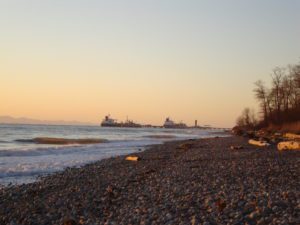Thanks to an outpouring of support from the community, the Whatcom County Council voted 4-3 on June 2nd to maintain the moratorium on permits that would increase through-shipments of unrefined fossil fuels at Cherry Point. This win for the Salish Sea ensures existing terminals don’t reconfigure to ship more crude oil, tar sands and fracked gas overseas — an even bigger threat now that we’re facing a surplus of crude oil due to lower demand in the past few months. Northwest Washington bears more than our fair share of risk and hazard already; we can draw the line.
Whatcom County has a unique opportunity to enact lasting protections from the local risks and impacts of bulk fossil fuel shipments. The county now has six more months to complete the Cherry Point amendments process to create lasting protections, which has been suspended for three months due to coronavirus.

Cherry Point
What laws are proposed beyond the moratorium?
The proposed amendments to the Whatcom County Code, to be voted on by the County Council later in 2020, would…
- Completely prohibit certain types of new fossil fuel facilities, like coal, fracked gas, and crude oil transshipment facilities.
- Require some conditions and greater public transparency for expansions of existing oil refineries and shipment terminals that would increase their shipping capacity.
- Continue to ensure prompt permitting for basic improvements or maintenance needed to continue operating.
There are unresolved policy debates around draft language concerning “change of use” for existing facilities, accounting for greenhouse gas pollution increases, and disclosure of insurance coverage and financial surety for remediation from disastrous incidents.
Stay tuned for updates on meetings, public comment opportunities, and other proceedings.
Why do we need transparent, multi-level oversight for local fossil fuel operations?
The goals of the Cherry Point amendments are to limit the risks and harms to people and ecosystems from expanded fossil fuel shipments through Whatcom. There are numerous reasons the proposed protections are critical to meeting that goal:
- Oil refining and transshipment are heavy impact, high-risk operations. Even with local refineries having the best intentions, unforeseen emergencies, natural disasters, human error, and disruptive crises (like a pandemic) further heighten the danger of hazardous incidents and outright catastrophe.
- In 2013, Whatcom County determined two oil train terminals were non-significant and permitted them without review of their impacts — despite the major risks posed by crude oil trains that have exploded twelve times in the US and Canada since.
- Cherry Point continues to be a targeted route for increased shipment from Canada of oil, gas, and tar sands — which is practically impossible to clean up if there is a spill.
- As our society transitions into a fully renewable energy economy but still relies in part on petroleum, it’s preferable to have domestic refineries supplying our fuels — rather than to have those fuels imported through the Salish Sea from overseas refineries. At the same time, the oil refineries’ corporate owners could use the transshipment terminals at Cherry Point to send crude oil overseas, which offers no benefit to local communities while we shoulder all the risks of volatile oil trains, more tankers in our waters,

Aerial of Cherry Point and San Juan Islands
Local decisions have global consequences
The impacts from fossil fuel transshipment expansions extend far beyond NW Washington, regionally and globally. It’s past time we put stronger health, safety and environmental safeguards in place for refineries.
When decisions are made by the corporate owners of industry (i.e. in London or Houston), the interests of workers, local communities, and ecosystems are not the driving priorities. But our county has a right to draw lines for public interests, health & safety.
Whatcom County has unique lawful authorities over Cherry Point development that are not substituted by federal or state agencies, even without the recent waves of regulatory rollbacks. County Planning & Development Services is usually the only agency reviewing permit applications for refinery expansion projects –like the oil train terminals approved in 2013 that brought a whole new level of risk to communities near and far along the rail route. With every project, the County determines if the project has significant impacts that warrant more thorough environmental review. In the last 25 years, out of hundreds of permits issued for upgrade projects at Cherry Point industries — some of the largest polluters in the Pacific Northwest handling millions of gallons of oil per day — not a single refinery project was determined by Whatcom County to have significant impacts.
What if all refinery upgrade projects had to result in cleaner, safer operations than before,? Whatcom County can make that happen, but not without making key changes to the development rules written in code. Let’s urge them to pass the proposed Cherry Point Amendmentsthis year.
Follow the county Cherry Point Amendments process here, and sign-up for our email list to stay engaged.
